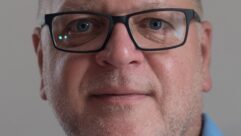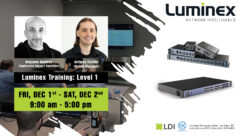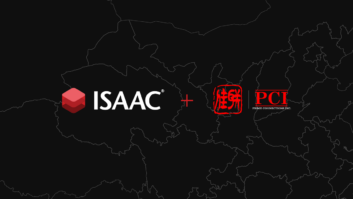Technology training for today
Mar 1, 1999 12:00 PM,
Ted Uzzle
What is technical training, and why would anybody want it? Those are subtlequestions. We all learn on the job. I sure did. Most of us had the greatbenefit of a knowledgeable acquaintance who would take the time to explainand demonstrate things we needed. I had the privilege of knowing manypeople whose expertise was exceeded only by their patience at my pesteringquestions. On-the-job training and accomplished colleagues, however, havetheir limits. They will not give us the big chunks of book-learning neededtoday, and they usually cannot open wholly new subject areas to us.
Technical training is meant to give us specific skills. The term “skill” isnot limited to such manual accomplishments as wiring cables onto the backsof connectors. Even those whose primary job is wiring cables onto the backsof connectors need intellectual skills-knowing when the wire is on thewrong terminal. Technical training that does not impart real skills of sometype may have some merits, but is hardly practical in an age whenincreasingly heavy demands are made on all employees.
In systems contracting, there is a special need for skills to bedistributed over a wide circle of employees. The natural career progressionin systems contracting is from installer, a blue-collar position, tosalesperson (who also needs to estimate jobs) or to systems designer, bothwhite-collar positions. To take an example, sound installers are usuallyquite interested to know how systems are designed, and to study electronictheory and acoustics; they have a real chance for advancement. That is oneof the glories of systems contracting and one of its appeals for thoseworking in it. This is quite distinct from electrical work, for example,where licensed electricians seldom become registered professionalelectrical engineers.
Technical training is a vital ingredient for success. Everyone, however,has a key question, “How can I get training that is practical andefficient, that will not waste my time and money, that will not fail me orlet me fail at it?”
Ways and meansWhat kind of training is available to systems contractors? Actually thereis a universe of training available today, more than anyone could evaluate,much less participate in. Let’s look at some of the main categories.
For those with the resourcefulness and perseverence, there isself-teaching. Library and bookstore shelves groan with the weight ofteach-yourself books. In a newer category, there are CD-ROMs withprogrammed lesson plans and exercises. This is the lowest-cost way to gettraining and the best way to tailor it to your individual needs.
There are, however, a couple of problems with self-teaching. Finding thebest materials or even the most appropriate ones can be tricky. Caveatemptor. These are easy to start but difficult to finish. Because the tempoof the learning must be generated from within, and because personal andprofessional lives, combined, can sometimes overwhelm other activities,many start with good intentions and never get far. Finally, if you getstuck on a point and cannot master it, there are no further resourcesincluded for additional explanation or practice.
Then there is the university, community college or vocational school. Someexciting things are happening there nowadays. Unlike their practice ofyears ago, most of them now welcome students of all ages as well aspart-time students and students who have little interest in receiving adegree from this training. In most places, you can sign up for a singlecourse you need whether or not it will lead to an academic credential. Asalways, however, if it is an accredited institution, you can be sure thefaculty is knowledgeable in the subject and has some certification, such asan advanced degree.
Here again, there are problems. The required investment of time and moneymay flabbergast you. The notion of dribbling the training out, two or threehours a week for months, may be a problem, especially if you are not alwaysthe master of your own time. Miss a few classes because you had to go outof town or work overtime on a big project, and you are sunk. The course isalmost certain not to be tailored to your professional needs.
Finally, consider the multi-day seminar. This might be offered by atraining organization, such as Syn-Aud-Con, or Rigging Seminars, or itmight be offered by a trade association, such as NSCA, CEDIA or INFOCOMM.These programs range from two days to two weeks. Concentrated doses assureyou that you can focus on the training and not be distracted until you havegotten the skills promised you. These events are sure to be oriented to thecareer needs of working professionals.
There can be problems with the multi-day seminars. Here, too, you need toask some hard-nosed questions. Is the instructor a professional trainerwith no background in the practical use of the subject matter? Is thetrainer a subject-matter expert with no ability to motivate andcommunicate? Are the course materials complete, sketchy or non-existent?Does the seminar consist of day-long lectures, or will you have a chance topractice what you learn and get individual coaching from the instructor,should you need it? Let’s look at a seminar now available regionally acrossthe United States and Canada, and see how it addresses training needs.
Technical Fundamentals of AudioThe Technical Fundamentals of Audio seminar was developed in 1990 andpresented by its three co-authors, Bob Bushnell, Tom Bouliane and me, inNew York, Chicago, Los Angeles, San Francisco and Boston. It was revivedfor NSCA’s Charlotte Expo in 1997, and its success there prompted a secondedition of the book with considerable revisions, and the revised programhas since been presented in Norfolk, VA, Las Vegas, Dallas, Secaucus, NJ,Chicago, Atlanta, Toronto, San Jose, CA, Hoboken, NJ, Indianapolis,Phoenix, Detroit, Boston, Dayton, OH, Los Angeles, Kansas City andArlington, TX. The 24th meeting of the seminar will take place at NSCA’sNashville Expo, and another group will join the many hundreds who have beenthrough the course.
The seminar meets three days, from 8:00 AM to 5:00 PM, except the last day,when it closes around 2:30 PM. Lunches and refreshments for the hourlybreaks are provided, as well as coffee and something to eat at 7:30 AM.Each participant receives a 192-page manual/workbook, a pen andhigh-lighter, a scientific calculator, badges with formula shortcuts and abag to carry all the materials.
There are no prerequisites for attending Technical Fundamentals of Audioexcept a desire to acquire audio skills and familiarity with the Englishlanguage. Although the manual has 16 chapters, the instruction is focusedupon 10 great skills that are the basis of all audio technology. The firstof these is use of the engineering number system, the millis, micros,kilos, megas, nanos, picos and their rarer kindred. The millivolts,microfarads and kilohertz can be a hurdle to beginners, but we showshortcuts to using them.
The second great skill is the decibel. There is no worse demon in audiothan the decibel, but the seminar breaks it down, shows where it comes fromand how to use it. Such usually thorny questions as when to use a 10xmultiplier and when to use a 20x multiplier are easy when you understandthe physical relationships upon which they are based.
The third great skill is circuit analysis with Ohm’s law. This law showsthe relationships of amps, watts, volts and ohms as they interact incircuits. Then, the seminar turns to Kirchhoff’s law and the analysis ofseries, parallel and series-parallel circuits. There is much audio gold tobe mined here, such as the general solution for wire loss between the ampand the loudspeaker. The next electrical skill masters reactive circuitsand the way they divide frequencies. In fact, at the conclusion of thischapter, the class designs a crossover network. The electrical section ofthe seminar closes with a section on so-called constant-voltagedistribution via transformers. Everything we have learned about Ohm’s law,Kirchhoff’s law and reactive circuits comes together as we consider how tomix voice coils and matching transformers on the same amp output.
Then the seminar turns to the physics of sound. We take up wave behaviorand see the interrelationship of speed, frequency, period and wavelength,and what these mean for audio. The eighth great skill of audio ispredicting wavefront spreading, first from such theoretical sources aspoints, lines and planes, then from real sound-producing devices. Theseminar concludes with a section on architectural acoustics in general andreverberation in particular.
Seminar methodsNo question about it, this is all book-learning, and there is math. Theseskills underlie audio, however, and are the means by which all audio can beunderstood. Each skill begins with an explanation, followed by ademonstration of the principle at work. Then, in each case, seminarparticipants are given an opportunity to practice the skill and go over itwith the instructor if they have trouble. The mathematical formulas are allprinted in the manual in the exact form they are keypunched into thescientific calculator. The seminar demonstrates how to substitute problemvalues into a formula and how to operate the calculator. Each participantcomes away from Technical Fundamentals of Audio knowing how to use the 10great skills of audio having already used them right in the class.
You probably noticed how many of these skills are applicable to most areasof electronic systems contracting. There’s nothing unique about soundreinforcement within Ohm’s law. There is nothing unique to audio at allabout reactive circuits. The millivolts and the microfarads will be foundthroughout video. Waves behave just the same way in a residentialinstallation as in a commercial or public-assembly venue.
That is not by accident. The further down toward the basics you go, themore widely they can be applied. Technical Fundamentals of Audio provides abackground useful throughout systems contracting, even though the practicalexamples are drawn from audio. There is a little overlap of content betweenTechnical Fundamentals of Audio and NSCA’s CATTS level I and II seminars,organized to help technicians prepare for the NICET certificationexamination. For that matter, there is a little overlap between theseseminars and the Syn-Aud-Con presentations. That’s perfectly natural anddesirable. It gives the seminar-goer a chance to see a few of the sametopics treated in quite different ways, for quite different purposes.
It is a good time for training in systems contracting. There are books andmagazines, courses in colleges and universities, and focused seminarsoffered regionally. Our industry is changing rapidly, but there is noshortage of good information. For information about the TechnicalFundamentals of Audio seminar, telephone 800-446-4164 or circle (301) onthe Reader Service Card. For information about the CATTS level I and IIseminar, telephone the same number or circle (302). For information aboutthe Syn-Aud-Con seminar, telephone 800-796-2831 or circle (303).










